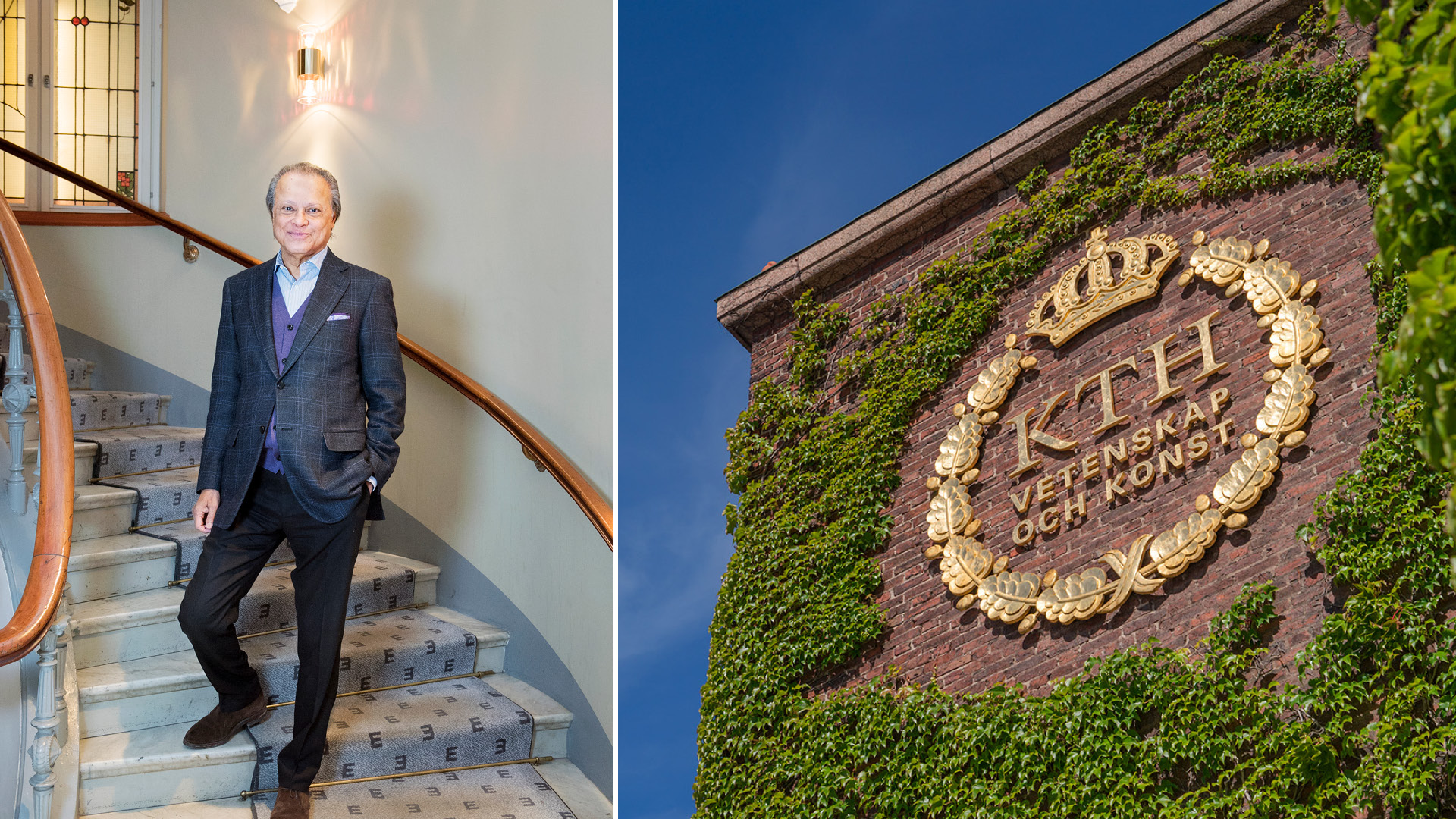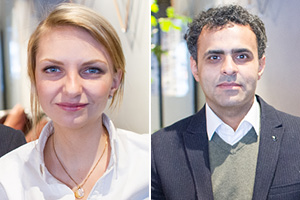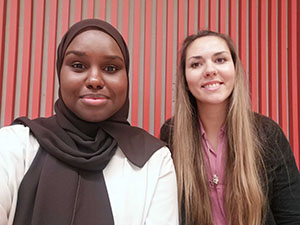Eight innovations creating future jobs in Sweden

Supporting people from KTH whose innovations can create jobs and prosperity in Sweden is the purpose of the Bicky Chakraborty Entrepreneur Program. Among those admitted to the program this year are the researchers behind CelluXtreme, developing "bio-based spare parts for the human body".
CelluXtreme's technology is the result of research within the Wallenberg Wood Science Center. They have developed a way of spinning continuous filaments (fibers) from nanocellulose, and have demonstrated on a lab scale how the technology could be used to produce super strong bio-based fibers that can compete with carbon fiber and fiberglass. The material can for example be implemented in the automotive and aerospace industries and for medical applications, such as in implants or "bio-based spare parts for the human body" as one of the founders, Daniel Söderberg, put it at the start of the program.
- The materials used today often end up in a landfill because they cannot be recycled, says Daniel Söderberg. Our material could replace carbon and fiberglass with a more sustainable alternative. However, the gap between a research result and having something on the market is quite large, so we hope that the program will give us a good environment where we can develop our thinking and how we should act.
Training and funding awaits
The Bicky Chakraborty Entrepreneur Program was founded after a donation from the hotel chain Elite Hotel's founder Bicky Chakraborty.
During a period of four months, the participants will meet three times to learn more about business modelling, sales technology, and scaling up their companies. The teams also get access to experienced, specially selected advisors and receive between SEK 50,000-100,000 in funding.
- As always, it is fun to have a mix of teams and people from different backgrounds in the program. It is also interesting to hear that despite their differences, they have similar needs and expectations. This allows us to keep the program’s content focused and relevant.
Helping companies make sense of sustainability data

Another team in the program is SustainLab. They develop a sustainability management platform to automate data collection and processing, as well as to help companies in their sustainability work according to best practice. As a result, companies can spend time on actions, not reporting, and accelerate change. Doctoral student Kamal Hakimzadeh has founded SustainLab together with Maria Svantemark, who has extensive experience of the subject from her work as sustainability manager at Findus.
- Sustainability data is often of low quality and rarely updated, says Maria Svantemark. We want companies to treat their sustainability data as equally business-critical as financial data. Otherwise, it will be a blocker for a sustainable society. In the program, we want to learn more about finding our market segment and raising capital, which we will do this autumn.
Starting with a crash course
At the first meeting, the participants got a crash course in lean startup methodology and business modelling, with the customer in focus. In the program, the participants will meet for half-day digital training sessions, supported by KTH Executive School.
- The teams can dive into their challenges directly, and at the same time learn from the other participants, says Viktor Olsson.
Creating growth and prosperity in Sweden
The program aims to support researchers, employees and students from KTH who run innovative projects with the potential to create growth and prosperity in Sweden. This is the sixth edition of the program.
- We are very happy to continue and further develop the collaboration with Bicky and Elite Hotels, Viktor Olsson concludes.
Text: Lisa Bäckman
The teams in the 2021 Bicky Chakraborty Entrepreneur Program
CelluXtreme
CelluXtreme commercializes a new technology for spinning continuous filaments (fibers) from nanocellulose, a result of research at the Wallenberg Wood Science Center. The technology has been demonstrated on a lab scale, which has shown how it can be used to produce super-strong bio-based fibers that can compete with carbon and glass fibers but without the problem of landfills that these materials have. Another example of use is functionalization to support cell growth, which enables a material that can be used in medical applications.
Team: Daniel Söderberg & Fredrik Lundell
Dogl
Math can be hard, frustrating, and scary, and to make matters worse many students don't know how to study it. They do everything they can to avoid actually doing math. You couldn't learn to ride a bike or play the violin without actually trying it, and you can't learn math that way either. We at Dogl have created an app for Calculus students that lets them do math in a fun and unintimidating way, with game-like features that keep them coming back. Math is needed for so many careers today. We need to give students the tools they need to succeed!
Team: Diane Holcomb, Olof Sisask & Jesper Sisask
LOGX
LOGX improves tracking and certification processes of the forest-based product supply chain by introducing transparency. The lack of transparency in these supply chains has led to increased costs, high levels of risk, and fraudulent activity. We offer immutable digital ledgers to record the different transactions involved in wood certification. With these immutable records of transactions, companies and auditors can verify the origins of the products/materials being purchased. We believe that our solution can bring these supply chains into the digital age and contribute to the fight against illegal logging.
Team: Stephen Moran, Raphael Matzker, Stefan Jonas Siddique, Stella Friberg & David Happel
Ordeca
Ordeca helps senior managers in private and public organizations to reduce the percentage of failing change projects. By offering a digital platform/SaaS solution for more effective organizational design. Ordeca is the only market provider with an enterprise solution integrated with advisory service.
Team: Oskar Törnblom & Lena Boström
OSCL Toolbox
Large industrial companies rely on a number of engineering software applications and platforms in their development process. These applications are not necessarily designed to easily integrate with each other, leading to inconsistencies in their product data and inefficiency in their development process. We provide tools for the easy integration of incompatible engineering software applications. By relying on the OASIS OSLC interoperability standard, we deliver vendor-independent integration solutions
Founder: Jad El-Khoury
Ovulai

Ovulai is a FemTech startup on a mission to make women’s health knowledge accessible and actionable. Female infertility affects at least 1 in 10 women, and the usual root cause is hormonal imbalance and an irregular menstrual cycle. We want to help these women by providing a personalized fertility solution for their unique menstrual cycles: an app that will give them personalized guidance for hormonal health improvement and a fertility-testing device that will track the most fertile days in an irregular menstrual cycle. Our personalized, data-driven solution increases the chances for pregnancy, sparing both time, money and distress for women and empowering them to take charge of their own fertility journey!
Team: Kristina Stojanovic, Sandra Liljeqvist, Leyla Ali Dholey & Katarina Stojanovic
Scatterin
Experimental data obtained at large-scale research facilities make the invisible visible and open up new possibilities towards materials and process innovation. However, data has no meaning without proper analysis. With today’s tools, data analysis takes months and requires deep knowledge about physics, materials, and processes. We thus developed a data analysis software: Scatterin. It uses in-house developed data analysis protocols together with materials database and makes data analysis easier, faster, and more reliable.
Team: Ahmet Bahadir Yildiz & Peter Hedström
SustainLab
Staying on top of sustainability best practice and understanding companies' sustainability impact is manual and complex, which makes it impossible to work with sustainability continuously and efficiently. At SustainLab, we are developing a Sustainability Management platform to automate data collection and processing, as well as to help companies in best practice sustainability work. As a result, companies can spend time on actions, not reporting, and accelerate change.
Team: Maria Svantemark & Kamal Hakimzadeh

